- Nov 29
- Drug Addiction Treatment
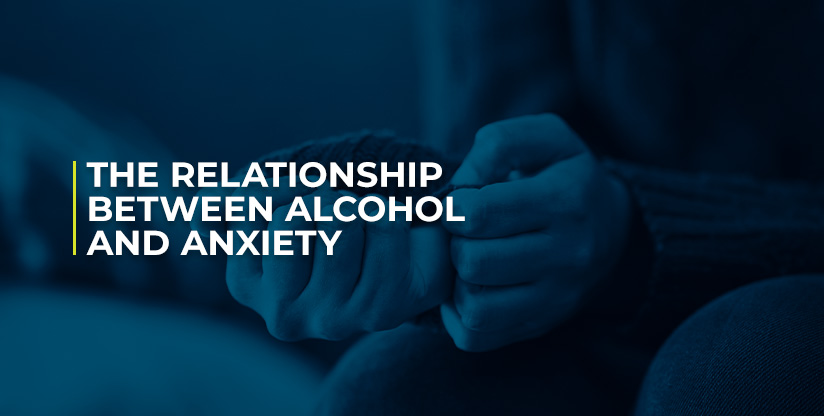
Everyone feels a little nervous when meeting new people, but social anxiety is much more than feeling a bit anxious in public spaces. Feeling shy usually goes away once you meet people or have a great conversation. Social Anxiety Disorder (SAD) causes heightened self-consciousness and an intense fear of being negatively judged by others.
It’s almost impossible to turn off invasive, negative thoughts when you have social anxiety. This form of fear can impact every aspect of your life, professionally and socially. Many use alcohol or drugs to feel comfortable in their skin. Sadly, this can lead to an alcohol use disorder.
Like any mental health condition, there are ways to overcome SAD without alcohol and drugs. With the right tools and mindset, you’ll be prepared to tackle your sobriety and your anxiety.
What Is Social Anxiety?
Social anxiety is one of America’s most common mental health disorders, affecting approximately 15 million adults in the United States today.
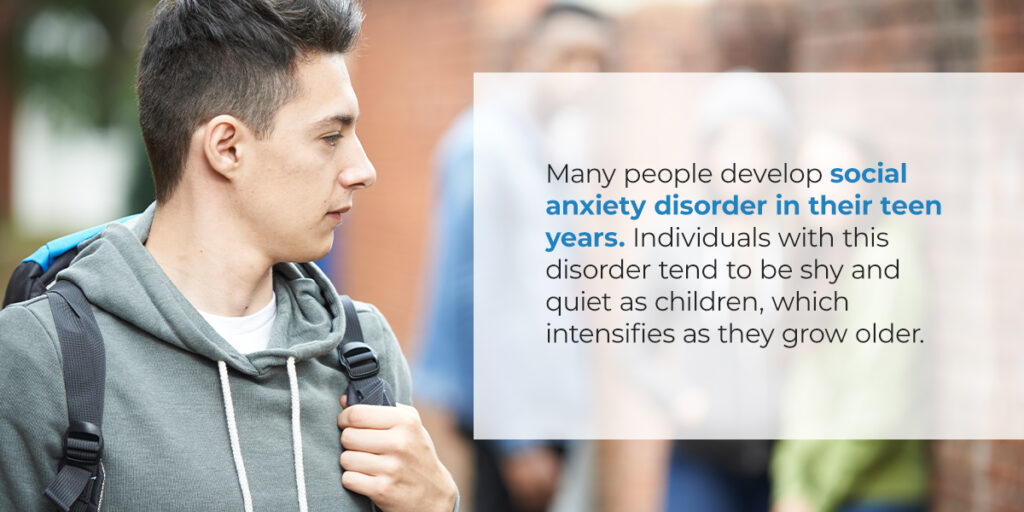
Social anxiety disorder involves a deep irrational fear of humiliation, especially during social interactions. Most people suffering from this disorder will experience anxious thoughts and worries that others are judging them. They’ll also fear situations where they need to communicate with people. These circumstances could include speaking in small groups, with strangers or in front of a crowd. Those with social anxiety will fear all types of social interactions altogether or enter them with extreme stress.
Many people develop social anxiety disorder in their teen years. Individuals with this disorder tend to be shy and quiet as children, which intensifies as they grow older. Young adults struggling with this disorder will often do anything to avoid their fears, such as skipping classes that require public speaking or accepting jobs beneath their abilities or desired pay so they can work alone.
While those suffering from this disorder might realize their social fears are irrational or unwarranted, they still find it near impossible to suppress or overcome them. It’s also common for those with severe social anxiety to report that alcohol enables them to feel more comfortable and act more freely in social situations. As a result, it’s unsurprising that many with this disorder will turn to alcohol as a means of relief. And many will not realize how alcohol misuse can exacerbate their anxiety symptoms and lead to lifelong alcohol dependence.
The Symptoms of Social Anxiety
Social anxiety can feel different for everyone, though symptoms tend to revolve around the inability to communicate with others or be in social situations without experiencing extreme anxiety. Individuals will also worry about being rejected or experience intense fear in situations where others are required to look at them, such as oral presentations.
For some people with anxiety disorders, their fear may be limited to specific social situations, such as speaking in public or beginning conversations. Others may be fearful of any type of social interaction.
The following are common situations people with this disorder tend to have difficulties with:
- Talking to strangers
- Dating
- Speaking in public
- Making eye contact
- Entering rooms
- Going to parties
- Participating in job interviews
- Using public restrooms
- Eating in front of other people
- Initiating conversations
- Going to school or work
People with social anxiety disorder can also experience physical symptoms, such as:
- Nausea
- Trembling
- Rapid heartbeat
- Muscle tension
- Inability to catch their breath
- Blushing
- Sweating
- Lightheadedness
- Extreme self-consciousness
- Excessive worrying
Many people with social anxiety also endure erratic sleep patterns or find it difficult to sleep. You may have a social anxiety disorder if you find it difficult to concentrate due to worrying about or self-analyzing your performance in social situations. You may have physical anxiety symptoms immediately before an event or spend weeks brooding over it. After, you may excessively worry about how you acted in the situation.
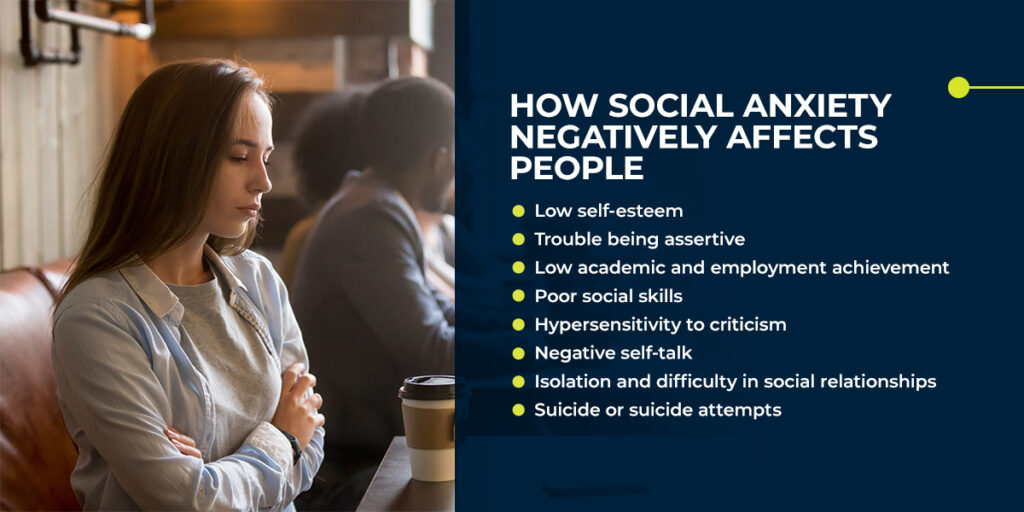
How Social Anxiety Negatively Affects People
If left untreated, social anxiety disorder can take over your life. Anxiety can interfere with your career, school or relationships and lead to a lower quality of life. This disorder can also cause:
- Low self-esteem
- Trouble being assertive
- Low academic and employment achievement
- Poor social skills
- Hypersensitivity to criticism
- Negative self-talk
- Isolation and difficulty in social relationships
- Suicide or suicide attempts
Social anxiety can also lead to other mental health disorders, such as depression or substance use disorder. These often co-occur with social anxiety disorder and will need to be treated simultaneously to reach a successful recovery.
The Link Between Social Anxiety and Drinking
Millions of people struggle with social anxiety. The physical, emotional and mental side effects of SAD can cause you to feel shaky, nauseous or light-headed. If you’re constantly afraid of embarrassing yourself in public, you may believe anything is better than those intense fears. Alcohol and drugs are common ways for people with social anxiety to handle their condition. They use these substances to mask their feelings and the physical side effects that come along with them.
Studies find that around one-fifth of individuals who live with a social anxiety disorder also live with an alcohol use disorder. Around 15% of those treated for alcoholism live with both disorders as well. This comorbidity is becoming more common as more studies take a closer look at social anxiety as a disorder in its own right.
Does Alcohol Make You Feel Relaxed and Confident?
Many people enjoy alcohol because it seems to reduce stress, so those with social anxiety feel more relaxed in social situations after drinking. Does alcohol help with anxiety? Alcohol’s ability to inhibit impulse control can also give you a boost of confidence.
These effects, however, are temporary. While it may seem to relieve your social anxiety, alcohol cannot resolve the source of your fears. Once the effects wear off, your anxiety returns with a vengeance. This back-and-forth leads many people to create an unhealthy cycle of heavy drinking or substance misuse for that momentary feeling of comfort.
If you combine social anxiety and alcohol and begin to exhibit some of the following symptoms, you may suffer from alcohol addiction:
- You’re prone to binge drinking, or heavy drinking in a short amount of time
- Your work or school life feels impacted
- You’re unable to stop drinking once you’ve started
- You feel the need to drink first thing in the morning
- Your amount of alcohol intake has resulted in hurting others
- You feel guilt or remorse after drinking
While drinking may temporarily reduce fear and worries, alcohol and anxiety attacks are not uncommon. Within hours or the day after drinking alcohol, you might experience heightened anxiety, irritability or depression. Even a moderate amount of alcohol can impact a person’s mood and anxiety levels.
Chronic alcohol misuse can also make it difficult to seek treatment for both your social anxiety and alcohol use disorder and interfere with the effectiveness of your therapy or medication once you’ve begun a treatment plan. While it’s never too late to get help, seeking treatment as soon as possible for alcohol use and anxiety disorder can increase your chances of a successful recovery.
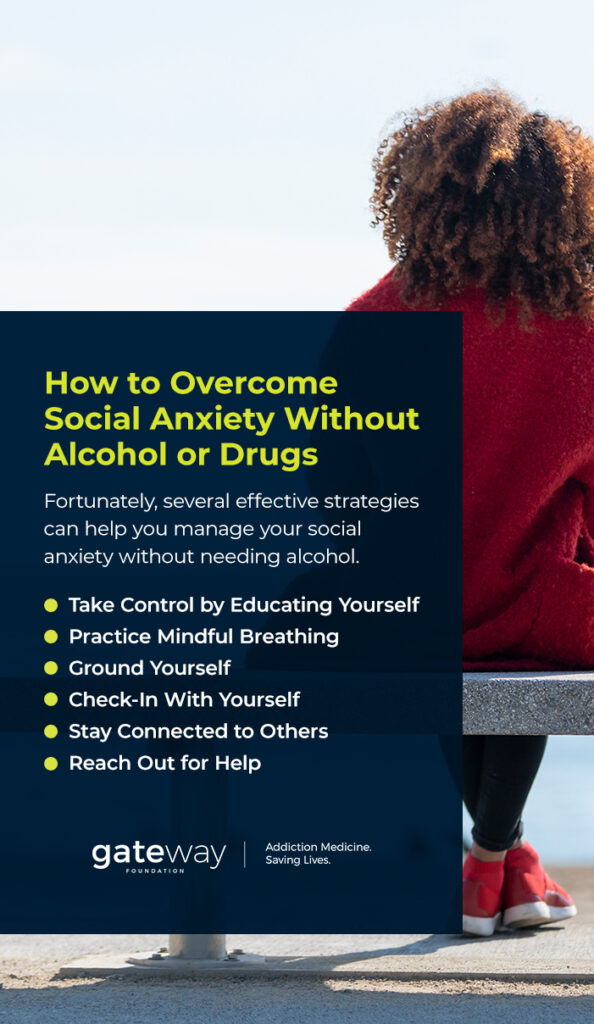
How to Overcome Social Anxiety Without Alcohol or Drugs
Many people begin drinking to ease their nerves and gain confidence in social situations. Since drinking is normalized and accessible in our culture, many people will turn to it as a means of self-medicating their anxiety symptoms without realizing the adverse effects it can present. Choosing to drink may seem like an easy way to get rid of social anxiety, though alcohol use can ultimately worsen your anxiety and lead to the devastating outcomes of addiction.
Fortunately, several effective strategies can help you get over your social anxiety without needing alcohol.
Take Control by Educating Yourself
Anxiety can be difficult to recognize at first and can seem overwhelming to control. One of the most empowering strategies for overcoming anxiety is to educate yourself about the disorder and how it works. Anxiety can manifest in shortness of breath, numbness and even chest pain. Many people who experience anxiety may believe they are having a stroke or heart attack, which can be intense when you’re unaware of these anxiety symptoms.
In social situations, you may feel as if your nervousness is visible to everyone around you, though this is often not the case. When you understand the symptoms of anxiety disorders, you can learn to recognize them within yourself to prevent panic or stop them in their tracks.
Instead of worrying over what others think of you, ask questions to shift the focus of the conversation to them. Learning how to direct, if not control, the conversation can help you stay more comfortable, even in awkward situations. It can take practice, but educating yourself on anxiety can help you communicate without fear and manage your symptoms without needing alcohol.
Practice Mindful Breathing
Anxiety symptoms can come up quickly in social situations, making it difficult to alleviate your fears and the visible signs of your attack. A natural response to stress and anxiety is rapid breathing as our bodies attempt to prepare for a fight or flight situation.
An effective way to combat rapid breathing and physical anxiety symptoms is to take slow, deep breaths through your nose. Deep breathing can help eliminate the dizziness and lightheadedness that often accompanies anxiety. When you find yourself in an anxiety-causing situation, remember to take a moment to calmly breathe until your symptoms dissipate.
If you’re anticipating a future social interaction or event, it can be helpful to practice deep breathing techniques on the morning of the event. In fact, just 20 to 30 minutes of abdominal breathing each day can help decrease your overall stress and anxiety.
Ground Yourself
Social anxiety can cause your thoughts to bounce around with worries and irrational fears about future social events. It can be helpful to try a grounding exercise when you’re feeling especially anxious to combat these thoughts.
Take note of your immediate surroundings or the things you can hear, see, smell, taste or touch in the present moment. By listing off these senses, you can quiet your anxious thoughts and reduce your physical symptoms. The 5-4-3-2-1 method can help quell your anxiety and help you feel more in control of your situation. To practice this technique, start by listing:
- Five things you hear
- Four things you see
- Three things you can touch
- Two things you can smell
- One thing you can taste
By shifting your attention from focusing on your social anxiety to thinking about your present sensations, you can learn to become more mindful and change your brain’s response to stress.
Check-In With Yourself
Social anxiety typically stems from circumstances we believe will happen but don’t come to fruition. When you put yourself in the present moment and ground yourself, you can start to see how your fears are irrational and work on ways to overcome them.
Checking in with yourself before a social event that might trigger your anxiety can be helpful. Try writing down your worries about the event before going. This way, you can take away their power before symptoms can occur. After the event, check back at your journal and see how many of your fears became a reality. Most likely, your anticipated threats never come to fruition, and over time you can prove that your anxiety is an inaccurate predictor of the future.
Stay Connected to Others
Social anxiety can feel isolating, especially when you feel as if you’re being judged or that you’re the only person suffering. In reality, social anxiety is widespread, and it’s highly likely the people surrounding you in social situations are also anxious or worried.
Remembering that you are not alone and that others might be just as worried about how they’re being perceived can make it a bit easier to manage your symptoms. Opening up about your struggles can help you find like-minded people who are also struggling and make you feel less alone. These connections can provide comfort in difficult times and help you gain the confidence you need in social situations.
Spend time with people who understand that you struggle with alcohol. Alcohol can play an enormous role in everyday social interactions, and it’s often impossible to avoid gatherings where drinking is either optional or expected. Surround yourself with supportive friends and family that understand what you’re going through instead of those that will pressure you to drink.
If you don’t have a trusted person to talk to, you might try joining a support group or attending group counseling. This way, you’ll meet people with similar struggles and work toward overcoming your social anxiety together.
Reach Out for Help
While social anxiety disorder can be challenging to navigate, professionals can successfully treat it with a combination of therapy and medication. Some prescription medicines may relieve your symptoms, while some methods — like cognitive-behavioral therapy — can help you learn new ways to think, respond and behave in situations that make you anxious.
Therapists can also help you develop social skills to improve your interactions and reduce anxiety. And when you enter an addiction treatment facility, specialists can simultaneously treat your anxiety and alcohol dependence to help you improve your overall quality of life.
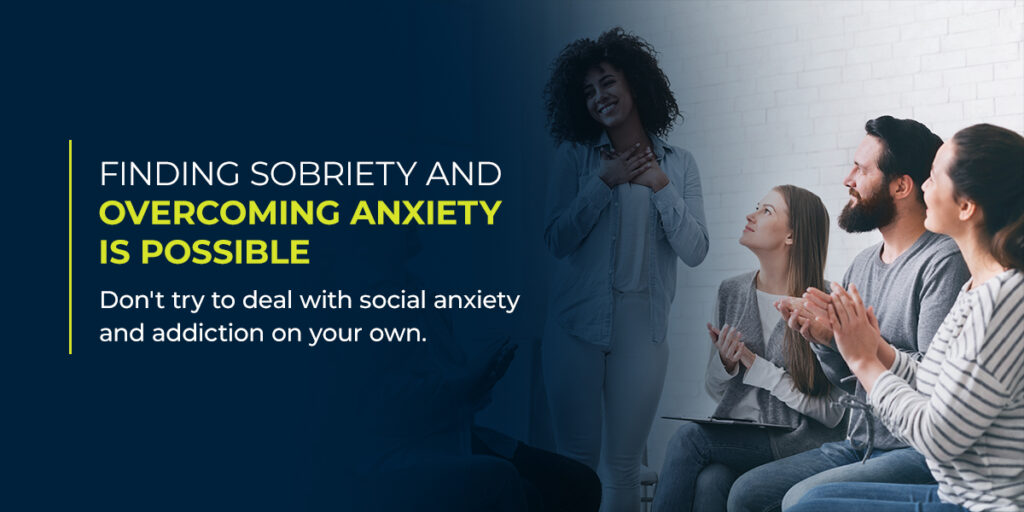
Finding Sobriety and Overcoming Anxiety Is Possible
If you struggle with substance use disorder rooted in social anxiety, holistic treatment is available at Gateway. We take the time to understand the triggers contributing to your alcohol use disorder or drug use to create an individualized holistic approach to your care. Our Dual Diagnosis Treatment program can provide the support and care needed to help you overcome alcohol use and anxiety disorders.
Don’t try to deal with social anxiety and addiction on your own. Contact us today to learn more about our anxiety treatment program.


